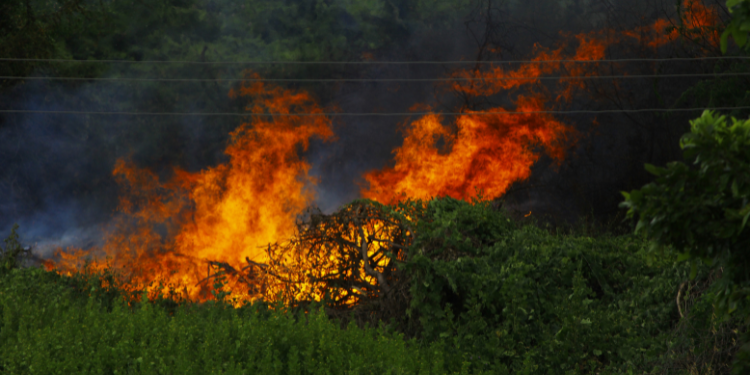News from Spain: Emergency military workers
Following the Casares (Guadalajara) fire in July 2005, which claimed the lives of eleven firefighters, the Zapatero Government, with José Bono as Minister of Defence, decided to initiate a study for the creation of a military unit dedicated exclusively to address emergency situations. The large forest fire had shown a worrying lack of coordination between public administrations, delays in making resources available, deficiencies in command and control of participants, etc. The political debate, following a usual pattern, was polarized about responsibility between rulers of different political affiliations.
In any case, the management of that contingency, with lethal consequences for firefighting personnel, highlighted the need to have a device of personnel deployed throughout the national territory and provided with a centralized command, permanently available to the civil protection system, whose powers on the ground had been transferred to the autonomous communities. The military nature of this force resolved a first difficulty in the creation of a body dependent on the central government, without affecting the regional services. For the Armed Forces, although it was not perceived that way at first, it was also an opportunity to regularize the frequent resort to military support in the event of disasters, managing to preserve ordinary units from interference in their usual missions. The new unit would have the necessary specialist personnel, trained and provided with the appropriate means to fulfil this mission of support to the community, without prejudice to resorting to massive military forces when, as has recently happened in Valencia, the dimension of the incidence would demand it.
The Military Emergency Unit (UME), established in record time and with few references in the Western countries, was received with all kinds of criticism of the government by the opposition who spoke of militarization of civil protection, of a parallel army outside the chain of command and improper use of the military function. Also, within the military, as was recently made public by disseminating the minutes of the high-level meeting in the ministry, voices were raised that opposed its creation on the grounds that it distracted the forces from the fundamental mission of National Defence.
However, a few months after its creation, once the new unit began to operate, the criticisms dissipated and turned into praise for the convenience and solvency of its performance. The unit, with a central base near Madrid (Torrejón de Ardoz), is deployed in different points of the national territory, pending its activation by the Ministry of Defence and at the express request of the autonomous communities, which must evaluate its need when they see their own resources exceeded. According to the established regulation, emergency management is the one that assigns the time, the area and the tasks to be carried out by the UME, which in its execution, within the permanent coordination with the management team, acts with full functional autonomy.
Aside from interested partisan debates, such as those that have taken place in recent weeks, there is a general consensus that the UME, with its capabilities and vocation for public service, has significantly strengthened the State’s response system in the face of all kinds of contingencies. Twenty years after its creation, the unit can present a brilliant record of service on the occasion of fires, snowfalls, floods, volcanic eruptions, major accidents, etc. Their work was essential in the unprecedented pandemic situation of 2020, and they have collaborated in international relations with highly appreciated interventions abroad. The UME, through rigorous professional performance and commendable dedication, has also been a valuable instrument for the improvement of civil-military convergence and has contributed significantly to the good image of military personnel and the Armed Forces as a whole.
The characteristics of the military organization, which acts subject to the principles of hierarchy, discipline and unity, symbolized in uniformity and external signs, have the effect of subsuming individuality in joint action, which makes it tend to see unit members as pieces of a system instead of people who, within the framework of a collective action, perform a job, according to their position and qualification. And it is in this capacity as emergency workers that the same standards apply as the rest of the workers protected by labour legislation, regarding guarantees of safety, protection, rest and compensation, responding appropriately to the availability requirements. permanent and urgent nature of interventions of this nature.
It is up to the representatives of military workers, belonging to professional associations established under the organic law of rights and duties of members of the armed forces, to ensure economic, social and professional interests through the exercise of associative action. Spanish legislation, abandoning the European reference at this point, contains important restrictions on the performance of representation, fundamentally due to the prohibition of carrying it out in the barracks themselves and the exclusion of any form of collective bargaining, an essential instrument of the labour relations of a Democratic system.
The exercise of the military profession, both in the fulfilment of its fundamental defence mission and in the subsidiaries of community support, has a social dimension that tends to be ignored by the public powers. In advanced democracies, the military cannot be a caste of sacrificed warriors, but rather citizens in uniform integrated into the society of their time, in full responsible exercise of their citizenship rights, with the temporal and functional restrictions that may arise from the service of the weapons, the exceptional nature of wartime and the accomplishment of the mission in the area of operations.
By Fidel Gómez Rosa, AUME, Spain
Read the original article in Spanish here.

